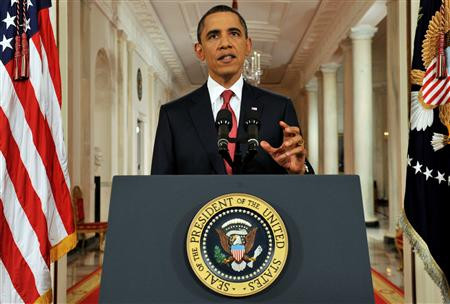President Obama Calls For the Congress and Americans to Unite

President Barack Obama made an address to the nation Monday about the increasingly dire debt crisis in which he warned that the Republicans' unyielding approach to the U.S. debt crisis was a "dangerous game" and urged Americans to press for compromise.
Obama delivered the warning in a rare primetime speech as Republicans and Democrats remained deadlocked over a deal to raise the U.S. debt ceiling.
"Do you know what people are fed up with most of all? They're fed up with a town where 'compromise' has become a dirty word," said Obama.
The president rejected a Republican proposal to temporarily lift the debt limit, arguing it would leave the underlying problem unresolved and lead to a repeat of the current crisis in six months.
"That is no way to run the greatest country on Earth. It is a dangerous game we've never played before, and we can't afford to play it now. Not when the jobs and livelihoods of so many families are at stake. We can't allow the American people to become collateral damage to Washington's political warfare." he said.
But with a potential U.S. default looming in eight days' time, Obama appealed to Americans to "make your voice heard."
"If you want a balanced approach to reducing the deficit, let your member of Congress know. If you believe we can solve this problem through compromise, send that message," he said.
It was to those people that the president aimed his address for nearly 15 minutes, warning that the national debt could wreak havoc on family checking accounts across the country.
The president urged Americans to call their members of Congress as two competing plans have been proposed but neither one follows Obama's hope for increased taxes.
Obama backs fellow Democrats who will raise the ceiling by $2.4 trillion in exchange for $2.7 trillion in cuts.
Republicans want a two-step plan, one immediately, and the other in 2012 just in time for a presidential election year.
House Speaker John Boehner spoke for five minutes after the president, echoing Obama's calls for compromise, but not his vision of what the president called "shared sacrifice."
"The president has often said we need a balanced approach, which in Washington means we spend more, and you pay more. Having run a small business, I know those tax increases will destroy jobs," said Boehner.
Still as the standoff shows no sign of ending analysts warn global financial panic hangs in the balance.
For now however, U.S. financial markets have appeared to take the political manoeuvring in their stride as Wall Street posted losses on Monday but there was no indication of a panic among investors.
Ahead of Obama's speech Republicans and Democrats upped the ante on Monday by putting forth competing plans to resolve the high stakes fight over the government deficit and increasing the U.S. borrowing limit. But no compromise is yet in sight.
Mayor Michael Bloomberg criticised Washington's stance and warned of potential economic consequences.
"While our budget deficit is bad enough, what's worse is Washington's leadership deficit that has put the nation on the brink of default," said Bloomberg earlier on Monday.
He had criticism for elements in both plans, but failed to come up with a tangible plan himself and remained vague about what the President should do next.
Senate Republican leader Mitch McConnell urged Obama to shift his position rather than "veto the country into default."
House Speaker John Boehner, in a nationally televised rebuttal, said he had given "my all" to work out a deal with Obama.
"The president would not take yes for an answer," he said.
He however also referred to the Republican approach, as "less than perfect", pointing out it does not take into account Obama's threat to veto a short-term plan, that would fail to raise the debt limit sufficiently to keep it from returning to the congressional agenda until after the 2012 elections.
Finding a compromise is extremely important so the U.S. can raise its Current 14.3 trillion U.S. dollar cap on borrowing, by August 2nd to prevent a potential financial catastrophe at home and abroad.
Without an increase in the debt limit, major global credit ratings agencies such as Moody's and Standard & Poor's have threatened to downgrade the U.S. government's triple-A credit rating.
An unprecedented U.S. default could cause spark turmoil in the U.S. financial system, and have dire consequences as it could force a delay in Social Security checks to retirees, payments to government contractors and other government spending.
The International Monetary Fund, meanwhile, reiterated its call for U.S. politicians to act quickly to solve the debt issue to "prevent significant global repercussions."
It was the second time the IMF has taken the unusual step of issuing public advice on a domestic U.S. tax and spending question.
The organization warned once again that the U.S. should both cut spending and raise taxes, with all actions carefully timed to prevent a renewed downturn in the American economy.
A drop in U.S. credit standing would likely increase the cost of U.S. government borrowing, which will directly impact on Americans as those seeking home mortgage or car loans would see interest rates climb, as would people with outstanding credit card balances.
© Copyright IBTimes 2025. All rights reserved.





















